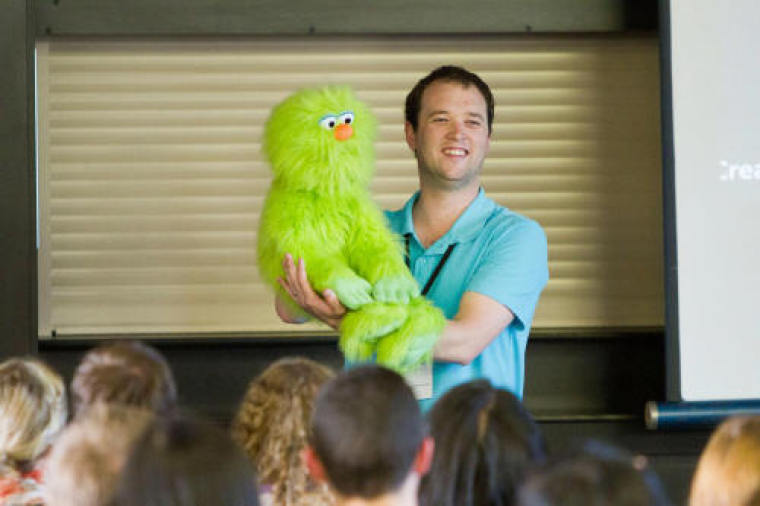

There are some great training programs out there. If you want fitness, there is the popular Couch to 5K—a self-motivated model with easily attainable goals. Or consider school and education—new information is given by someone in the know, learned, then assessed to see if learning has been completed.
This method is our normal go to. It is great for short term learning, or goal set learning. That is, if we need to know something in particular we seek an expert, find the information we need, then leave. It's great if you want to learn something in particular. When it comes to churches though, and training, this model will only get us so far. We need something more.
Consider the Star Wars method.
What?
No, I didn't just make it up and yes, it's a real method... well, it's real in Star Wars!
Yoda famously said: 'Two there will always be. A master and an apprentice'.
Now, for the Star Wars fans amongst us, the 'doctrine of two' actually derives from the baddies, but the good guys used this method of master and apprentice—or master and 'padawan' as the Jedi called them.
What is needed?
Within the church, there are many different areas we would like to train for. For churches with a regular weekly service, think of all the elements of the service itself. There are presentation skills needed for welcoming, music, notices, prayer and kids' talks. There are behind-the-scenes skills needed for ad-ministry and rosters. There are teaching skills needed for leading small groups, preaching and teaching kids' church and youth group. There are pastoral skills needed for caring for people, following them up and counselling when appropriate... the list goes on.
A lot of skills are needed to help a church function well and serve well in order to bring glory to God. So how are we training people for these areas?
If you have been involved in several churches over a long period of time, you would be familiar with workshop-based training. Someone stands up the front and says how we could be leading/doing said thing. Then we go away and give it a shot, hoping for the best.
But is it the best?
What if we reconsidered the way we did training within church? What if we took a leaf out of the Star Wars world?
Jedi training
Training could be so much more than just being told and giving it a go. Imagine if we were partnered with someone who helped us along the way—from start to finish—and then down the line as well.
Imagine if we had a Jedi master... of church ministry.
What if it were possible to match learners with mentors—experts who don't just 'teach and leave' but walk beside learners as they grow?
In Star Wars the Jedi master/padawan learnt through life. Much in the same way as the Apostle Paul and Timothy, Paul and Titus, Paul and Barnabas, King David and the prophet Samuel, the prophets Elijah and Elisha, Jesus and the twelve disciples, Jesus and the three...
Wait a moment, wait a moment?! This method isn't from Star Wars. IT'S FROM THE BIBLE!
Who is your Jedi master?
Whatever we are doing, we can be thinking 'who is coming along with me on this, so I can help train them in what I am doing?' Or even more than that: 'I wonder who my master in this could be? Who could "travel" with to help me learn more?'
If you have a mentor, rather than just catching up for coffee and talking life, take it a little more intentionally. Read a book together. Have questions you can ask each other. Have things to work through and be challenged by. If you are mentoring someone else... it's the same thing. Find a book to read together (and no, I don't mean the Lord of the Rings, or the latest Star Wars comic!). Find a book to prompt conversation. Something the mentor can speak into from experience and something to create conversation for the apprentice.
This is not a new idea
This is obviously not a new idea, and has been tried and tested by many. If you are unsure how to find a mentor, talk to your minister or someone who knows your congregation well. Good mentors are both encouraging and constructive. But know that feedback is a good thing! Feedback makes us stronger. Feedback is your friend[i].
Hollywood and mentoring
I leave you with this fun exercise to try. How many fictional stories can you think of that use a mentoring relationship? Yes, you can Google lists... but that's not fun.
I asked friends on Facebook, and we came up with quite a comprehensive list:
Qui-Gon Jinn and Obi Won Kenobi
Yoda and Luke Skywalker
Obi-Won Kenobi and Anakin Skywalker
Mr Miyagi and the Karate Kid
Alfred and Bruce Wayne
Dumbledore and Harry Potter
Morpheus and Neo
Jonathon Kent and Clark Kent
The Teenage Mutant Ninja Turtles and Splinter
Mentoring... when the Bible and Hollywood agree.
[1]Sandy Galea is a big fan of feedback and she has her team recite 'feedback is my friend' regularly to help them remember that feedback is not negative but a positive part of the learning process. See www.kidswise.com.au
Stephen Urmston is based in Melbourne and is completing a Masters of Divinity at Ridley College. He is currently employed as an associate Children's and Family minister.
Stephen Urmston's previous articles may be viewed athttp://www.pressserviceinternational.org/stephen-urmston.html